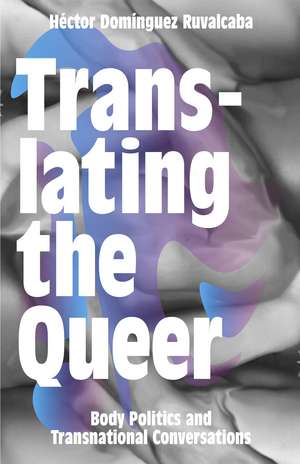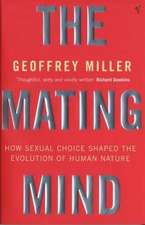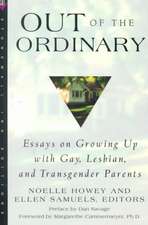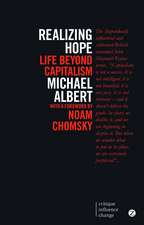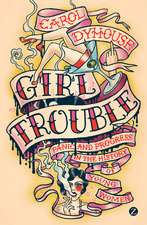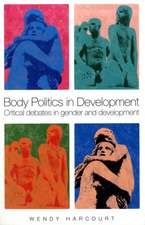Translating the Queer: Body Politics and Transnational Conversations
Autor Héctor Domínguez Ruvalcabaen Limba Engleză Paperback – 14 noi 2016
| Toate formatele și edițiile | Preț | Express |
|---|---|---|
| Paperback (1) | 132.71 lei 6-8 săpt. | |
| ZED BOOKS – 14 noi 2016 | 132.71 lei 6-8 săpt. | |
| Hardback (1) | 508.70 lei 6-8 săpt. | |
| ZED BOOKS – 14 noi 2016 | 508.70 lei 6-8 săpt. |
Preț: 132.71 lei
Preț vechi: 153.52 lei
-14% Nou
Puncte Express: 199
Preț estimativ în valută:
25.39€ • 26.58$ • 21.14£
25.39€ • 26.58$ • 21.14£
Carte tipărită la comandă
Livrare economică 01-15 aprilie
Preluare comenzi: 021 569.72.76
Specificații
ISBN-13: 9781783602926
ISBN-10: 1783602929
Pagini: 192
Dimensiuni: 140 x 216 x 20 mm
Greutate: 0.27 kg
Editura: ZED BOOKS
Colecția Zed Books
Locul publicării:London, United Kingdom
ISBN-10: 1783602929
Pagini: 192
Dimensiuni: 140 x 216 x 20 mm
Greutate: 0.27 kg
Editura: ZED BOOKS
Colecția Zed Books
Locul publicării:London, United Kingdom
Notă biografică
Héctor Domínguez Ruvalcaba is associate professor in the Department of Spanish and Portuguese at the University of Texas, Austin. He is author of Modernity and the Nation in Mexican Representationsof Masculinity, among other books.
Cuprins
Acknowledgements
Introduction: Troubles and travels of the queer
1. Queer decolonization
2. Queerness and the nation in peripheral modernity
3. LGBT politics and culture
4. Beyond LGBT struggles: Trans politics and neoliberal sex
Conclusion
References
Index
Introduction: Troubles and travels of the queer
1. Queer decolonization
2. Queerness and the nation in peripheral modernity
3. LGBT politics and culture
4. Beyond LGBT struggles: Trans politics and neoliberal sex
Conclusion
References
Index
Recenzii
“Ruvalcaba offers a concrete vision of queer resistance, one that it is not just a movement for gender liberation but also a transnational quest to decolonize the present. A must read for anyone grappling with queer politics in the Americas.”
“A profound work that will illuminate both how, through the figure of the queer, Latin Americanists should consider central concepts such as the nation, citizenship, and identity; and how queer theorists outside Latin America might envision a more thorough understanding of histories of the queer.”
“Ruvalcaba’s significant contribution to queer studies is a survey of the field’s more contemporary scholarship produced in Latin America and abroad. . . . Very useful for scholars looking to expand the exchanges between translation and queer theories.”
“There is much to be learned from Translating the Queer about socio-sexual processes in Latin America and the always-frayed fabric of the heterosexist project.”
Descriere
Descriere de la o altă ediție sau format:
Examines how queer theory has migrated to and developed within Latin America and asks how far the queer can go as a conceptual tool.
Examines how queer theory has migrated to and developed within Latin America and asks how far the queer can go as a conceptual tool.
